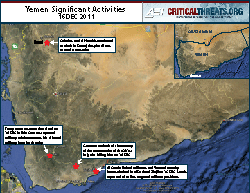 |
Yemen’s new government has produced a plan to demilitarize the country’s cities that will begin to be implemented Saturday. It is far from clear whether armed opposition groups will heed the call to withdraw and therefore, whether Yemeni military forces will also withdraw.
Gunmen ambushed the convoy of a senior army officer in Lahij governorate along a road leading to Taiz Friday. The commander of the 201st armored brigade, Colonel Saadan Mohammed al Sufi, was killed. A security official has accused al Qaeda of being behind the attack.
Al Qaeda-linked militants and Yemeni security forces clashed in al Kod and in Zinjibar in Abyan governorate Thursday. Local sources reported that airstrikes targeted militant positions. At least three soldiers were injured.
Fighting between Salafists and al Houthis has continued in Damaj in Sa’ada governorate. Abu Ismail, a Salafist spokesman, reported that the al Houthis bombed a mosque and other buildings in the town center. He also said that the al Houthi ceasefire proposal had been rejected, noting most of the members on the committee were al Houthi supporters.
Protesters turned out across the country to demonstrate against the regime. The protesters called for the prosecution of President Ali Abdullah Saleh.The largest demonstration was in Taiz, where two youths were shot dead as they headed home along Jamal Street, near Hurriyah (Freedom) Square.
Yemeni Vice President Abdul Rab Mansour al Hadi made public a plan to demilitarize Yemen’s cities. The plan, which will begin to be implemented Saturday, calls for all security forces and armed tribesmen in the capital and in other cities to withdraw from civilian buildings and for checkpoints to be taken down. Drafted by the new military committee, the plan emphasizes the return of forces to their positions in January 2011, before the unrest broke out in the country. Some sources have reported that military reinforcements were deployed from al Janad military camp to the Taiz governorate headquarters.
← Previous |
Next → |
